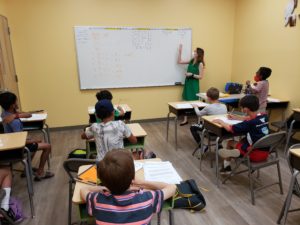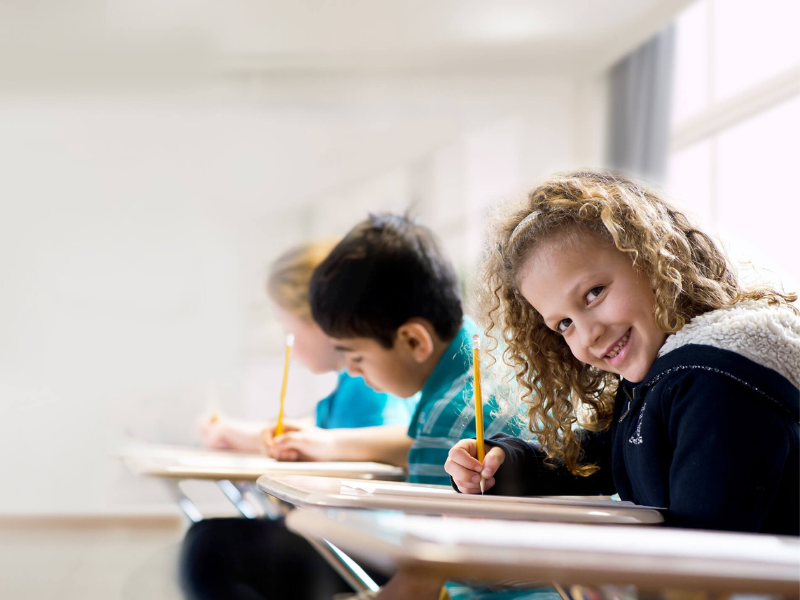Russian School of Mathematics (RSM) is celebrating 25 years of providing quality education and a deeper understanding of math.
The Birth of a Movement
It all started in 1997 when Inessa Rifkin and Irina Khavinson, Jewish refugees who fled the oppression of the Soviet Union, were deciding where and how to educate their own children. They had left the USSR in search of a free and democratic society, eventually landing in Newton, Massachusetts, a suburb of Boston. Rifkin, who was born in Minsk, Belarus, and Khavinson, born in Chernigov, Ukraine, were both educated in the classical tradition of Russian math. It was after Rifkin realized that her children weren’t as knowledgeable in math as she was at their age that the Russian School of Mathematics was born.
The first RSM lessons were taught around Ms. Rifkin’s kitchen table. Two years later, in 1998, the first dedicated RSM building was opened in Newton. Over the next two decades, RSM’s approach would prove to be unmatched in its instruction of mathematics. New teachers or former students, all trained in the original philosophy of “Russian math” adapted for the U.S., opened new branches under the guidance of Rifkin and Khavinson. What began as a passionate parent and gifted teacher’s desire to provide quality education to their children has gone on to create a new movement in the American education system.
With more than 50,000 students at 70 locations across the U.S. and Canada, RSM has continued to flourish despite the tremendous challenges that the COVID-19 pandemic brought with it. Last year saw the opening of a brand-new, state-of-the-art location in Tysons Corner, Virginia, and this September, RSM will welcome the newest branch to their growing family in Chevy Chase, Maryland.
What is “Russian Math?”
While there is no single definition, educators and historians agree that what we think of as “Russian math” has less to do with a rigid school of thought and more to do with unlocking proficiency through an understanding of abstract mathematical concepts. It’s also about a child’s overall mental development, using instruction to further develop a student’s intellect and character. The Russian method wants you to know how to find the answer to a math problem, but more importantly, it wants you to understand why that was the way to solve the problem.
RSM builds on this philosophy by providing students with a highly interactive class experience, where kids are encouraged to participate at all times. Due to its strongly rooted belief in abstract learning, RSM doesn’t just teach recitation, but rather gives students the tools they need to break down complex problems and work through assignments on their own. This has led to a de-emphasis of standardized testing which instead favors a strong mathematical foundation through class discussions and engagement in friendly conversation.
The RSM Approach
Different from traditional public schooling, RSM students stay with their same classmates from year to year. RSM founders believe this gives their students the foundation to build lasting connections and a sense of trust with their peers. Students are distinguished by traditional grade levels, yet within each grade level, there are three to four separate classes defined by an individual student’s proficiency in math. “Any child can learn math,” Regional Director Viktoriya Palamarchuk states confidently. “We want kids to be challenged but not overwhelmed.”
RSM leverages the power of its community in the classroom. A typical instructional day starts with students reviewing their homework before taking a brief assessment or quiz. Teachers then introduce the new material for the day, wrapping up their lessons with a spirited class discussion, often leading to a friendly debate among peers. Cultivating an environment that promotes dialogue among its students is paramount to RSM’s approach. Students are encouraged to ask many questions, share their thoughts and grow together.
An integral aspect of the RSM method is the traditional teacher-led classroom; they don’t offer one-on-one tutoring, emphasizing the students’ combined effort of discovery. RSM is confident that this method supports deeper retention of mathematical knowledge. Prospective students aren’t expected to be math aficionados to attend, either. RSM accepts passionate learners of all abilities, from pre-K through high school. Classes are held after school on weeknights and the weekend. Incoming students of the same grade and level are positioned together, while continuing RSM students maintain the stability of a consistent classroom community.
The Numbers Don’t Lie
It’s easy to see why RSM has seen so much growth in a relatively short amount of time when you look at the success their students are having. In 2020, RSM eighth graders scored an average of 723 out of a potential 800 points on the math portion of the SAT. To put that in perspective, the statewide average for eighth graders on the math portion was 524: that’s over 200 points better than their non-RSM peers!
At last November’s HMMT, one of the most prestigious high school math competitions in the world, Team RSM placed seventh out of 150 teams and won the signature Guts Round, an 80-minute team event with 36 short-answer questions. Most teams aren’t even expected to finish all 36 questions.
In the 2019 American Mathematics Competition, one of the most challenging math competitions open to middle schoolers, there were only 151 perfect scores out of the 94,742 students who participated. Of those 151 perfect scores, 15 of them were from RSM students.
It’s not just academic success that defines an RSM student. Their alumni are going on to be some of the most influential figures in business, engineering, advocacy and technology. Take, for example, RSM alum Anna Auerbach, co-founder and co-CEO of Werk, which was recently acquired by The Mom Project. Or Daniel Balson, the advocacy director for Europe and Central Asia for Amnesty International USA. Daniel works with U.S. government representatives in Congress and the executive branch to ensure that human rights are prioritized and protected. Or Asya Bashina, a graduate of Cornell’s selective Cornell Tech MBA program. An advocate for Women in Tech, Asya is now the senior marketing manager for Humatics, a leading microlocation platform.
Getting Started
As with all activities in life, the younger one starts, the more potential they have to master their chosen field. For parents interested in enrolling their child, RSM recommends scheduling a free evaluation with a member of their staff. Evaluations enable the school to get a sense of your child’s needs and help them recommend a class that bests suits their knowledge and ability. To schedule an evaluation, click here.

RSM LOCATIONS:
RSM Chevy Chase
8401 Connecticut Ave, Chevy Chase, MD 20815 |
202-843-8080 | chevychase@russianschool.com
RSM North Bethesda
5230 Tuckerman Ln, Unit 100, North Bethesda, MD 20852 |
571-843-8080 | northbethesda@russianschool.com
RSM Washington, D.C.
1763 N St NW, Washington, DC 20036 |
202-996-8844 | dc@russianschool.com
RSM Ashburn
The Heights at Goose Creek Village, 21021 Sycolin Rd, Suite 055, Ashburn, VA 20147 |
571-440-2020 | ashburn@russianschool.com
RSM Herndon
13007 Worldgate Dr., Herndon, VA 20170 |
571-306-2355 | herndon@russianschool.com
RSM Tysons Corner
7121 Leesburg Pike Falls Church, Vienna, VA 22043 |
571- 334-8472 | tysonscorner@russianschool.com
Related
Russian School of Mathematics is Primed for In-Person Learning
After-School Programs in the DMV


